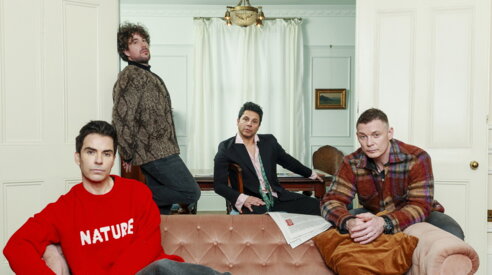Britpop, Back to the Future. Interview with Stereophonics


music
"The Oasis reunion shines a spotlight on an entire era. It's not just a nostalgic moment, but an opportunity for everyone." This is the version of Richard Jones, bassist for the Welsh and stubborn Stereophonics, performing live today at the Ama Music Festival and tomorrow in Rome. The new album
“The Oasis reunion shines a spotlight on an entire era. It's as if their return offers a pretext to rediscover that musical world, pushing people to seek out and listen to other names from that period, like Shed Seven or the Bluetones, and to remember how much quality music existed and how rich the Britpop scene was.” The words of Richard Jones, bassist of Stereophonics , resonate like an unexpected but pleasant signal . Britpop, the musical movement that set the 1990s ablaze, has never died. At most, it has remained dormant, ready to rise again with the same cheeky air as always . And the return of the Gallagher brothers is proof of this. When you think of British rock and pop, your mind immediately flies to them, to Blur, Pulp, the Verve. But there is one band that has managed to carve out a well-defended corner, mixing rock muscle and provincial melancholy: the Welsh and stubborn Stereophonics. Since 1992, they've built a discography that feels like a marathon. Albums like Word Gets Around (1997), Performance and Cocktails (1999), and Language. Sex. Violence. Other? (2005) are milestones that have established them without the need for drama or sibling bickering.
Now the group returns with their thirteenth album, a long and programmatic title: Make 'em Laugh, Make 'em Cry, Make 'em Wait . A declaration of intent against the trend of endless albums, the ones that leave you exhausted before you're halfway through. "We wanted to create something more immediate, a short album, not far from those of the bands of the '70s ," says Jones. Eight dry songs to "encourage people to listen to them multiple times without getting bored." An act of faith in the audience, and a hark back to when LPs fit in your hand, not in a cloud.
The band's sonic identity remains firm, with a few wrinkles but well-maintained. "After almost thirty years, the band still sounds like us: we're still the same. Kelly's voice is unmistakable," says the bassist. Yet there's no shortage of updates: "We've modernized the sound a little with songs like Seems Like You Don't Know Me and Backroom Boys ," he explains, admitting he doesn't shy away from technology when it helps polish the result .But Stereophonics' artistic journey has certainly not been without its upheavals. The biggest, undoubtedly, was the death in 2010 of drummer Stuart Cable , the band's original driving force. "Things have changed since then," Jones admits, "but that's exactly what a band is all about: showing people we can evolve ." Stereophonics' music is a living organism, and the loss of a member only spurred a further process of transformation. This same ability to adapt is also reflected in their artistic choices.
And so tonight they'll be on stage at the AMA Music Festival in Romano D'Ezzelino , Veneto, alongside Franz Ferdinand; tomorrow, August 29th, it'll be Rome's turn, at the Auditorium Parco della Musica . For their entrance, they chose to play a treat: the theme from The Warriors . "When we were at school, Kelly and I would imitate scenes from the film, a cult from our childhood," laughs Jones. A choice they share with other bands with cinephile quirks: Coldplay opening with ET , Metallica with Morricone.
The strength of Stereophonics is precisely this: honoring their roots without being stuck in the past. It's heard in songs like "Have a Nice Day," "Maybe Tomorrow," and "Dakota" : songs that combine radio-friendly melodies with echoes of the Beatles and Led Zeppelin. It's not sterile nostalgia, but the ability to incorporate memories and renew them. And perhaps that's why Jones welcomes the Oasis reunion as a collective occasion. "It's not just a nostalgia exercise, but an opportunity for everyone." Also to remember that the '90s, beneath the Adidas sweatshirts and bowl cuts, had, above all, a sound.
ilmanifesto




